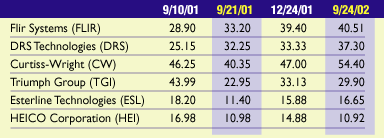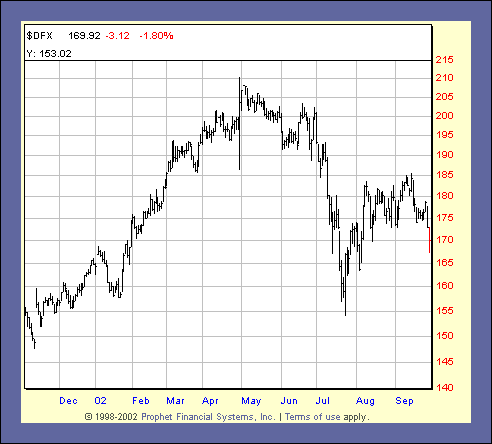
HOT TOPICS LIST
- Strategies
- Stocks
- Buy
- Investing
- Brokers
- Psychology
- Interviews
- Accumulate
- Sell
- Hold
- Spotlight
- Websites
- Candlestick Corner
- Gold & Metals
- Options Trading
LIST OF TOPICS
FOCUS ON
Defense Stocks
10/15/02 03:57:48 PM PSTby David Penn
With Afghanistan now and Iraq soon to come, can you go wrong investing in defense stocks?
| "Let's have a war," crooned punk rock lyricist Lee Ving of the rock group Fear. "Jack up the Dow Jones." While investors may not be precisely crooning right now, the sentiments linking war and stock market performance are neither unfamiliar nor uncommon. Still, it is a strange combination. Market observers and analysts pointed to the declining market in the late summer and early autumn of 2002 as evidence that "the market was anti-war," referring to the war rhetoric between US President/commander-in-chief George W. Bush and Iraqi president-for-life Saddam Hussein — with half a dozen international politicians, arms inspectors, and former US cabinet officials thrown in for good measure. And to suggest that war presents good stock-buying opportunities is really not unlike suggesting that being run over by a truck presents a great chance to take advantage of your company's health plan. After all, if fear of war drives down stocks, and a successful (at least initially) series of battles lifts stocks back more or less to where they were before the shooting started, then what exactly have you gotten for your troubles? To steal a line from Edwin Starr's 1970 soul-shouting, anti-war classic, the answer might be "absolutely nothing." The July 2002 lows were not particularly connected to talk of a US-led war against Iraq. At the time, "corporate corruption" was still making headlines, with company after company either reporting accounting irregularities or scrambling to make the August 13th deadline by which corporate officers were required to personally attest to the accuracy of all corporate financial statements. Nevertheless, these corporate corruption anxieties (or, perhaps, anxieties about what sort of "fix" that Congress and President Bush would fixate on) were more than enough to drive a weak stock market to its lowest point of the year. As the markets began their relief rally in late July and into August, a new challenge to stock bulls surfaced: the growing likelihood of a war against Saddam Hussein's Iraq. This challenge was manifested shortly after September 11, 2002 — the anniversary of the terrorist attacks in the US — when President Bush addressed the United Nations, calling on the international body to insist upon Iraq's complete adherence to UN resolutions for disarmament and inspections. "If the UN will not act, the United States will," the President declared. The markets promptly sold off, with the Standard & Poor's 500 dropping from about 920 to about 820 in 10 days.
STOCKS AND WAR TALKThere was talk of a "war premium" on defense stocks in the wake of September 11, 2001, particularly when it became clear that the United States would invade Afghanistan and depose the Taliban regime that had provided aid and comfort to those responsible for the attacks. Looking at how many of these defense stocks performed, both in the first three months and a year later, we note that the war premium, if it existed, appears to have been quite mixed. Three out of the five biggest defense stocks (Figure 1) have made significant gains on both their post-September 11th prices as well as their prices the day before the attacks — when there was little other than the traditional fondness of Republican Presidents for defense spending to make investors believe such stocks would see significant gains. Some of these gains have been quite sizable. Northrop Grumman (NOC) is up 53% since September 10, 2001, and Lockheed Martin (LMT) is up a whopping 67%.
Figure 1: Large-cap defense stocks from the announced US War on Terrorism to war plans for Iraq.
A glance at mid-cap defense stocks — stocks with a market capitalization between $5 billion and $1 billion suggests more of the same (Figure 2). For every Flir Systems (up 22% since September 21, 2001) and Curtiss- Wright Corp. (up 35% over the same period), there is a HEICO Corp. (more or less unchanged since September 21, 2001) or a Triumph Group (up 30% from its September 21, 2001, price, but down 32% from its price on September 10).
Figure 2: Smaller-cap defense stocks fared little better than their large-cap peers.
A STOCKPICKER'S MARKETThese results suggest that while defense stocks have performed well in the year since the September 11, 2001, terrorist attacks in the US, there has been a loser for every winner. It follows that, even among defense stocks, investors would be wise to separate those that are outperforming the market from those that are merely treading water — or worse, underperforming an S&P 500 that itself is down 25% from September 10, 2001, and is still down 15% from September 21, 2001. There are a few defense-related stocks not listed that are noteworthy, primarily based on the technical strength of their stock charts (Figure 3). These stocks range from the mid-cap Alliant Techsystems (ATK) to micro-caps like Todd Shipyards (TOD) and Aerosonic Corp. (AIM).
Figure 3: Some of the better-performing defense-related stocks varied from large to micro-cap.
Some of these stocks — particularly the micro-caps — suffer from particularly low average daily trading volumes and, as such, are probably less appropriate options for certain investors (such as institutions) than others (such as retail investors). But overall, these stocks have been real performers: AIM up 28% from its pre-September 11th price, ATK and TOD up 62% and 70%, respectively, and EASI was up an eye-popping 96% from its closing price on September 10.
Figure 4: The Philadelphia defense index is up almost 18% since November 2001.
Looking forward, defense stocks will certainly benefit from the ongoing war on terrorism — although perhaps less than initially believed in the wake of the armament-heavy battles fought in Afghanistan. A US-led invasion of Iraq would also likely lift defense stocks. However, the important question is whether there has been a secular shift back toward increased military spending, as opposed to a temporary response to the terrorist attacks of September 11, 2001, and the declared intention to oust Iraq's Saddam Hussein.
David Penn may be reached at DPenn@Traders.com. Data courtesy of Yahoo! Finance, Prophet.net
Current and past articles from Working Money, The Investors' Magazine, can be found at Working-Money.com.
|
Technical Writer for Technical Analysis of STOCKS & COMMODITIES magazine, Working-Money.com, and Traders.com Advantage.
| Title: | Traders.com Technical Writer |
| Company: | Technical Analysis, Inc. |
| Address: | 4757 California Avenue SW |
| Seattle, WA 98116 | |
| Phone # for sales: | 206 938 0570 |
| Fax: | 206 938 1307 |
| Website: | www.traders.com |
| E-mail address: | DPenn@traders.com |
Traders' Resource Links | |
| Charting the Stock Market: The Wyckoff Method -- Books | |
| Working-Money.com -- Online Trading Services | |
| Traders.com Advantage -- Online Trading Services | |
| Technical Analysis of Stocks & Commodities -- Publications and Newsletters | |
| Working Money, at Working-Money.com -- Publications and Newsletters | |
| Traders.com Advantage -- Publications and Newsletters | |
| Professional Traders Starter Kit -- Software | |
PRINT THIS ARTICLE

Request Information From Our Sponsors
- StockCharts.com, Inc.
- Candle Patterns
- Candlestick Charting Explained
- Intermarket Technical Analysis
- John Murphy on Chart Analysis
- John Murphy's Chart Pattern Recognition
- John Murphy's Market Message
- MurphyExplainsMarketAnalysis-Intermarket Analysis
- MurphyExplainsMarketAnalysis-Visual Analysis
- StockCharts.com
- Technical Analysis of the Financial Markets
- The Visual Investor
- VectorVest, Inc.
- Executive Premier Workshop
- One-Day Options Course
- OptionsPro
- Retirement Income Workshop
- Sure-Fire Trading Systems (VectorVest, Inc.)
- Trading as a Business Workshop
- VectorVest 7 EOD
- VectorVest 7 RealTime/IntraDay
- VectorVest AutoTester
- VectorVest Educational Services
- VectorVest OnLine
- VectorVest Options Analyzer
- VectorVest ProGraphics v6.0
- VectorVest ProTrader 7
- VectorVest RealTime Derby Tool
- VectorVest Simulator
- VectorVest Variator
- VectorVest Watchdog




